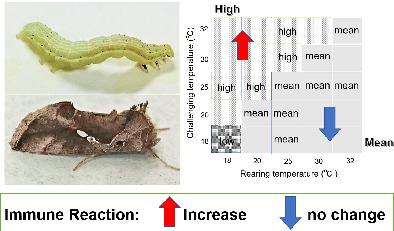当前位置:
X-MOL 学术
›
Physiol. Entomol.
›
论文详情
Our official English website, www.x-mol.net, welcomes your
feedback! (Note: you will need to create a separate account there.)
Integrated effects of thermal acclimation and challenge temperature on cellular immunity in the plusiine moth larvae Chrysodeixis eriosoma (Lepidoptera: Noctuidae)
Physiological Entomology ( IF 1.6 ) Pub Date : 2020-11-23 , DOI: 10.1111/phen.12344 Yumi Takano 1 , Takuma Sakamoto 1 , Hiroko Tabunoki 1 , Jin Yoshimura 2, 3, 4, 5, 6 , Kikuo Iwabuchi 1
Physiological Entomology ( IF 1.6 ) Pub Date : 2020-11-23 , DOI: 10.1111/phen.12344 Yumi Takano 1 , Takuma Sakamoto 1 , Hiroko Tabunoki 1 , Jin Yoshimura 2, 3, 4, 5, 6 , Kikuo Iwabuchi 1
Affiliation

|
Temperature is one of the most influential factors for animals. The acclimation (rearing) and challenge temperatures are often more important than the given temperature per se. These effects on physiological responses have been known, but not well understood on immune responses. Here, we investigated the integrated effects of rearing and challenge temperatures on haemocyte populations in larvae of a plusiine moth, Chrysodeixis eriosoma. We hypothesize that the haemocyte concentration is decreased (increased) at higher (lower) temperatures from rearing temperatures and that the proportions of haemocyte types exhibit directional changes at higher (lower) temperatures to compensate for immune reactions. We expect that increasing (decreasing) the challenge temperature from the rearing temperature enhances (reduces) phagocytic activity. We found that higher temperatures slightly decreased the haemocyte concentration. We detected small changes in the proportions of haemocyte types among rearing temperatures, but the changes were non‐directional and most of them were statistically insignificant. We also found the integrated effects only with increases in the challenge temperatures, which resulted in increased phagocytosis, whereas no apparent reactions were detected with decreases in the challenge temperatures. Our results show that the haemocyte concentration is significantly affected by the rearing temperature, which implies that haematopoiesis depends on the ambient temperature. We discuss some adaptive and non‐adaptive components for the positive integrated effects of increases in the challenge temperatures. We also discussed the obtained non‐responsiveness in the integrated effects with decreases in the challenge temperatures.
中文翻译:

热适应和挑战温度对小蛾类幼虫Chrysodeixis eriosoma(鳞翅目:夜蛾科)细胞免疫的综合影响。
温度是对动物影响最大的因素之一。适应(上升)和挑战温度通常比给定温度本身更重要。这些对生理反应的影响是已知的,但对免疫反应却不甚了解。在这里,我们调查了饲养和挑战温度对小蛾蛾(Chrysodeixis eriosoma)幼虫血红细胞种群的综合影响。我们假设从饲养温度开始,较高(较低)温度下血细胞浓度降低(增加),并且在较高(较低)温度下血细胞类型的比例显示方向变化,以补偿免疫反应。我们期望通过提高饲养温度来提高(降低)攻击温度可以增强(降低)吞噬能力。我们发现较高的温度稍微降低了血细胞浓度。我们在饲养温度之间检测到血细胞类型比例的细微变化,但这些变化是无方向性的,并且大多数在统计学上均不显着。我们还发现,仅随着挑战温度的升高,其综合作用会导致吞噬作用增加,而没有发现明显的反应,挑战温度降低。我们的结果表明,血红细胞浓度受饲养温度的显着影响,这表明造血作用取决于环境温度。我们讨论了一些挑战性和非适应性因素,以应对挑战性温度升高的积极综合影响。我们还讨论了随着挑战温度降低而获得的综合效应中的无反应性。
更新日期:2020-11-23
中文翻译:

热适应和挑战温度对小蛾类幼虫Chrysodeixis eriosoma(鳞翅目:夜蛾科)细胞免疫的综合影响。
温度是对动物影响最大的因素之一。适应(上升)和挑战温度通常比给定温度本身更重要。这些对生理反应的影响是已知的,但对免疫反应却不甚了解。在这里,我们调查了饲养和挑战温度对小蛾蛾(Chrysodeixis eriosoma)幼虫血红细胞种群的综合影响。我们假设从饲养温度开始,较高(较低)温度下血细胞浓度降低(增加),并且在较高(较低)温度下血细胞类型的比例显示方向变化,以补偿免疫反应。我们期望通过提高饲养温度来提高(降低)攻击温度可以增强(降低)吞噬能力。我们发现较高的温度稍微降低了血细胞浓度。我们在饲养温度之间检测到血细胞类型比例的细微变化,但这些变化是无方向性的,并且大多数在统计学上均不显着。我们还发现,仅随着挑战温度的升高,其综合作用会导致吞噬作用增加,而没有发现明显的反应,挑战温度降低。我们的结果表明,血红细胞浓度受饲养温度的显着影响,这表明造血作用取决于环境温度。我们讨论了一些挑战性和非适应性因素,以应对挑战性温度升高的积极综合影响。我们还讨论了随着挑战温度降低而获得的综合效应中的无反应性。









































 京公网安备 11010802027423号
京公网安备 11010802027423号